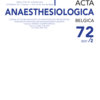Perception and knowledge of anesthesia and the role of anesthesiologists : a Belgian single-center cross-sectional survey
Published online: Mar 29 2022
Abstract
Study Objective : To assess the knowledge of anesthesia and the role of anesthesiologists and evaluate the prevalence of concerns of certain risks of anesthesia and surgery in Belgian patients.
Design : Observational mono-center cross-sectional survey.
Setting : Preoperative patients planned for elective surgery in Jessa Hospital, Belgium.
Interventions : An observational survey in Dutch.
Measurements : Patient demographics and characteristics, perception of the patient of the expertise, role, and responsibility of the anesthesiologist, knowledge of the patient regarding anesthesia, and patients´ fear of specific risks and side effects of anesthesia and surgery. Associations were analyzed with the Pearson correlation coefficient or the Spearman rank’s correlation coefficient.
Main Results : In total 361 patients completed the survey. Patient demographics were as follows : 54.8% males, mean age (± SD) 58,84 ± 16,38 years. Most patients (87.3%) recognized anesthesiologists as specially trained medical doctors but more than 50% underestimated their different perioperative responsibilities. Patients underestimated the dura-tion of education of an anesthesiologist in 84.2%. Their role at the intensive care unit (69.3%), the emergency department (71.2%), and the delivery room (71.2%) were relatively well known. Their role at the chronic pain management clinic (44.8%) and the preoperative anesthesia consultation (40.7%) was less well known. Some patients thought that general anesthesia frequently results in brain damage (22.7%). Older age and lower educational level were associated with lower knowledge. In general, 8.3% of all patients were very anxious about anesthesia, 22.7% somewhat, and 69% not at all. Female gender and lower educational level were positively correlated with a higher risk of fear. : Most patients in this single-center Belgian cohort were aware that anesthesiologists are specialized medical doctors. Overall, the patient´s knowledge of the anesthesiologist’s expertise and responsibilities and anesthesia was rather limited.
